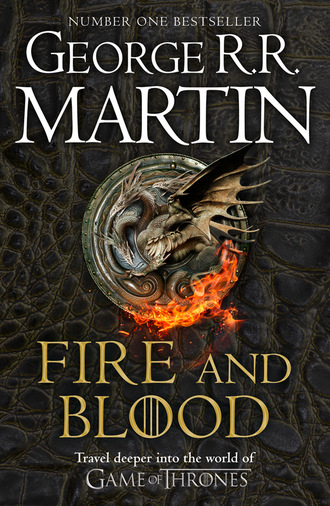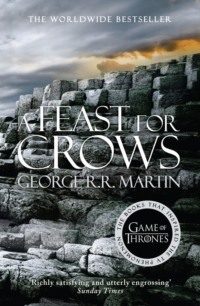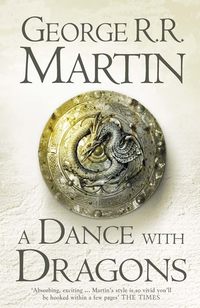
Полная версия
Even within the walls of Lord Farman’s own seat, Queen Rhaena had enemies, chief amongst them his lordship’s heir. Ser Franklyn had fought in the Battle Beneath the Gods Eye and taken a wound there, blood shed in the service of Prince Aegon the Uncrowned. His grandsire had died upon that battlefield together with his eldest son, and it had been left to him to bring their corpses home to Fair Isle. Yet it seemed to him that Rhaena Targaryen showed little remorse for all the grief she had brought to House Farman, and little gratitude to him personally. He also resented her friendship with his sister, Elissa; instead of encouraging her in what he regarded as her wild, willful ways, Ser Franklyn thought the queen should be enjoining her to do her duty to her house by making an appropriate marriage and producing children. Nor did he appreciate the manner in which the Four-Headed Beast had somehow become the center of court life at Faircastle, whilst his lord father and himself were increasingly disregarded. In that he was well justified. More and more highborn lords from the westerlands and beyond were visiting Fair Isle, Maester Smike noted, but when they came it was to have audience with the Queen in the West, not with the minor lordling of a small isle and his son.
None of this was of great concern to the queen and her familiars so long as Marq Farman ruled in Faircastle, for his lordship was an amiable and good-natured man who loved all his children, his wayward daughter and weakling son included, and loved Rhaena Targaryen for loving them as well. Less than a fortnight after the queen and Androw Farman had celebrated the first anniversary of their union, however, Lord Marq died suddenly at his own table, choking to death upon a fish bone at the age of six-and-forty. And with his passing, Ser Franklyn became the Lord of Fair Isle.
He wasted little time. On the day after his father’s funeral, he summoned Rhaena to his great hall (he would not deign to go to her), and commanded her to remove herself from his island. “You are not wanted here,” he told her. “You are not welcome here. Take your dragon with you, and your friends, and my little brother, who would surely piss his breeches if he were made to stay. But do not presume to take my sister. She will remain here, and she will be wed to a man of my choosing.”
Franklyn Farman did not lack for courage, as Maester Smike wrote in a letter to the Citadel. He did lack for sense, however, and in that moment he did not seem to realize how close he stood to death. “I could see the fire in her eyes,” the maester said, “and for a moment I could see Faircastle burning, the white towers blackening and collapsing into the sea as flames leapt from every window and the dragon wheeled about again and again.”
Rhaena Targaryen was the blood of the dragon, and far too proud to linger long where she was not wanted. She departed Fair Isle that very night, taking wing for Casterly Rock upon Dreamfyre after instructing her husband and companions to follow her by ship, “with all those who might love me.” When Androw, flushed with anger, offered to face his brother in single combat, the queen quickly dissuaded him. “He would cut you to pieces, my love,” she told him, “and were I to be thrice widowed, men would name me a witch or worse and hound me from Westeros.” Lyman Lannister, Lord of Casterly Rock, had sheltered her before, she reminded him. Queen Rhaena was confident that he would welcome her again.
Androw Farman, Samantha Stokeworth, and Alayne Royce set out to follow the next morning, together with more than forty of the queen’s friends, servants, and hangers-on, for Her Grace had gathered a sizable coterie about her as the Queen in the West. Lady Elissa was with them as well, for she had no intention of remaining behind; her ship, the Maiden’s Fancy, had been made ready for the crossing. When the queen’s party reached the docks, however, they found Ser Franklyn waiting for them. The rest of them could go, and good riddance, he announced, but his sister would remain on Fair Isle to be wed.
The new lord had brought only half a dozen men with him, however, and he had seriously misjudged the love the smallfolk bore his sister, particularly the sailors, shipwrights, fisherfolk, porters, and other denizens of the dockside districts, many of whom had known her since she was a small girl. As Lady Elissa confronted her brother, spitting defiance at him and demanding that he get out of her way, a crowd gathered around them, growing angrier by the moment. Oblivious to their mood, his lordship attempted to seize his sister … whereupon the onlookers rushed forward, overwhelming his men before they could draw their blades. Three of them were shoved off the docks into the water, whilst Lord Franklyn himself was thrown into a ship’s hold full of fresh-caught cod. Elissa Farman and the rest of the queen’s friends boarded Maiden’s Fancy untouched and set sail for Lannisport.
Lyman Lannister, Lord of Casterly Rock, had given Rhaena and her husband Aegon the Uncrowned refuge when Maegor the Cruel was demanding their heads. His bastard son, Ser Tyler Hill, had fought with Prince Aegon under the Gods Eye. His wife, the formidable Lady Jocasta of House Tarbeck, had befriended Rhaena during her time at the Rock and had been the first to discern that she was with child. Just as the queen had expected, they welcomed her now, and when the rest of her party landed in Lannisport, the Lannisters took them in as well. A lavish feast was held in their honor, an entire stable was given over to Dreamfyre, and Queen Rhaena, her husband, and her companions of the Four-Headed Beast were assigned a regally appointed suite of apartments deep in the bowels of the Rock itself, safe from any harm. There they lingered for more than a moon’s turn, enjoying the hospitality of the wealthiest house in all of Westeros.
As the days passed, however, that very hospitality grew ever more disquieting to Rhaena Targaryen. It became apparent to her that the bedmaids and servants assigned to them were tattlers and spies, bringing word of their every doing back to Lord and Lady Lannister. One of the castle septas asked Samantha Stokeworth whether the queen’s marriage to Androw Farman had ever been consummated, and if so, who had witnessed the bedding. Ser Tyler Hill, Lord Lyman’s comely bastard son, was openly scornful of Androw, even whilst doing all he could to ingratiate himself to Rhaena herself, regaling her with tales of his exploits at the Battle Beneath the Gods Eye and showing her the scars he had taken there “in your Aegon’s service.” Lord Lyman himself began to express an unseemly interest in the three dragon eggs that the queen had brought from Fair Isle, wondering how and when they might be expected to hatch. His wife, Lady Jocasta, suggested privately that one or more of the eggs would make a fine gift, if Her Grace should wish to show her gratitude to House Lannister for taking her in. When that ploy proved unsuccessful, Lord Lyman offered to buy the eggs outright for a staggering sum of gold.
The Lord of Casterly Rock wanted more than just a highborn guest, Queen Rhaena realized then. Beneath the warmth of his veneer, he was too cunning and too ambitious to settle for so little. He wanted an alliance with the Iron Throne, possibly through marriage between her and his bastard, or one of his trueborn sons; some union that would raise the Lannisters up past the Hightowers, the Baratheons, and the Velaryons to be the second house in the realm. And he wanted dragons. With dragonriders of their own, the Lannisters would be the equals of the Targaryens. “They were kings once,” she reminded Sam Stokeworth. “He smiles, but he was raised on tales of the Field of Fire; he will not have forgotten.” Rhaena Targaryen knew her history as well; the history of the Freehold of Valyria, writ in blood and fire. “We cannot remain here,” she confided to her dear companions.
There we must leave Queen Rhaena for a time, whilst we cast our eyes eastward again toward King’s Landing and Dragonstone, where the regent and king remained at odds.
Vexing as the issue of the king’s marriage was to Queen Alyssa and Lord Rogar, it must not be thought that it was the only matter that concerned them during their regency. Coin, or rather the lack of coin, was the Crown’s most pressing problem. King Maegor’s wars had been ruinously expensive, exhausting the royal treasury. To refill his coffers Maegor’s master of coin had raised existing taxes and imposed new ones, but these measures brought in less gold than anticipated and only served to deepen the anathema with which the lords of the realm regarded the king. Nor had the situation improved with the ascension of Jaehaerys. The young prince’s coronation and his mother’s Golden Wedding had both been splendid affairs that had done much to win him the love of lords and smallfolk alike, but all that had come at a cost. An even larger expense loomed ahead; Lord Rogar was determined to complete work on the Dragonpit before handing the city and the kingdom over to Jaehaerys, but the funds were lacking.
Edwell Celtigar, Lord of Claw Isle, had been an ineffectual Hand for Maegor the Cruel. Given a second chance under the regency, he proved to be an equally ineffectual master of coin. Unwilling to offend his fellow lords, Celtigar instead decided to impose new taxes on the smallfolk of King’s Landing, who were conveniently close at hand. Port fees were tripled, certain goods were to be taxed both coming into and out of the city, and new levies were asked of innkeeps and builders.
None of these measures had the desired effect of filling up the treasury vaults. Instead building slowed to a halt, the inns emptied, and trade declined notably as merchants diverted their ships from King’s Landing to Driftmark, Duskendale, Maidenpool, and other ports where they might evade taxation. (Lannisport and Oldtown, the other great cities of the realm, were also included in Lord Celtigar’s new taxes, but there the decrees had less effect, largely because Casterly Rock and the Hightower ignored them and made no effort to collect.) The new levies did, however, serve to make Lord Celtigar loathed throughout the city. Lord Rogar and Queen Alyssa received their share of opprobrium as well. Another casualty was the Dragonpit; the Crown no longer had the funds to pay the builders, and all work on the great dome ceased.
Storms were gathering to both north and south as well. With Lord Rogar occupied in King’s Landing, the Dornishmen had grown bold, raiding more frequently into the marches, even troubling the stormlands. There were rumors of another Vulture King in the Red Mountains, and Lord Rogar’s brothers Borys and Garon insisted they did not have the men and money required to root him out.
Even more dire was the situation in the North. Brandon Stark, Lord of Winterfell, had died in 49 AC, not long after his return from the Golden Wedding; the journey, the northmen said, had asked too much of him. His son Walton succeeded him, and when a sudden rebellion broke out in 50 AC amongst the men of the Night’s Watch at Rimegate and Sable Hall, he gathered his strength and rode to the Wall to join the leal watchmen in putting them down.
The rebels were former Poor Fellows and Warrior’s Sons who had accepted clemency from the boy king, led by Ser Olyver Bracken and Ser Raymund Mallery, the two turncloak knights who had served in Maegor’s Kingsguard before abandoning him for Jaehaerys. The Lord Commander of the Watch, unwisely, had given Bracken and Mallery command of two crumbling forts, with orders to restore them; instead the two men decided to make the castles their own seats and establish themselves as lords.
Their uprising proved short-lived. For every man of the Night’s Watch who joined their rebellion, ten remained true to their vows. Once joined by Lord Stark and his bannermen, the black brothers retook Rimegate and hanged the oathbreakers, save for Ser Olyver himself, who was beheaded by Lord Stark with his celebrated blade Ice. When word reached Sable Hall, the rebels there fled beyond the Wall in hopes of making common cause with the wildlings. Lord Walton pursued them, but two days north in the snows of the haunted forest, he and his men were set upon by giants. It was written afterward that Walton Stark slew two of them before he was dragged from his saddle and torn apart. His surviving men carried him back to Castle Black in pieces.
As for Ser Raymund Mallery and the other deserters, the wildlings gave them a cold welcome. Rebels or no, the free folk had no use for crows. Ser Raymund’s head was delivered to Eastwatch half a year later. When asked what had befallen the rest of his men, the wildling chieftain laughed and said, “We ate them.”
Brandon Stark’s second son, Alaric, became the Lord of Winterfell. He would rule the North for twenty-three years, an able man though a stern one … but for a long while he had no good to say of King Jaehaerys, for he blamed the king’s clemency for his brother Walton’s death, and was oft heard to say that His Grace should have beheaded Maegor’s men rather than sending them to the Wall.
Far removed from the troubles in the North, King Jaehaerys and Queen Alysanne remained in their self-imposed exile from the court, but they were anything but idle. Jaehaerys continued his rigorous training regimen with the knights of his Kingsguard every morn, and devoted his evenings to poring over accounts of the reign of his grandsire Aegon the Conqueror, on which he wished to model his own rule. Dragonstone’s three maesters assisted him in these inquiries, as did the queen.
As the days passed, more and more visitors made their way to Dragonstone to talk with the king. Lord Massey of Stonedance was the first to appear, but Lord Staunton of Rook’s Rest, Lord Darklyn of Duskendale, and Lord Bar Emmon of Sharp Point came hard on his heels, followed by the Lords Harte, Rollingford, Mooton, and Stokeworth. Young Lord Rosby, whose father had taken his own life when King Maegor fell, turned up as well, sheepishly pleading for the young king’s forgiveness, which Jaehaerys was pleased to grant. Though Daemon Velaryon, as the Crown’s lord admiral and master of ships, was in King’s Landing with the regents, that did not prevent Jaehaerys and Alysanne from flying their dragons to Driftmark and touring his shipyards, escorted by his sons, Corwyn, Jorgen, and Victor. When word of these meetings reached Lord Rogar in King’s Landing he grew furious and went so far as to ask Lord Daemon if the Velaryon fleet could be used to prevent these “lords lickspittle” from crawling to Dragonstone to curry favor with the boy king. Lord Velaryon’s reply was blunt. “No,” he said. The Hand took this as a further sign of disrespect.
Meanwhile, Queen Alysanne’s new ladies-in-waiting and companions had settled in on Dragonstone, and it soon became apparent that her mother’s hope that these Wise Women might persuade the little queen that her marriage was unwise and impious had gone seriously awry. Neither prayer, sermons, nor readings from The Seven-Pointed Star could shake Alysanne Targaryen’s conviction that the gods had meant her to marry her brother Jaehaerys, to be his confidant and helpmate and the mother of his children. “He will be a great king,” she told Septa Ysabel, Lady Lucinda, and the others, “and I will be a great queen.” So firm was she in her belief, and so gentle and kindly and loving in all else, that the septa and the other Wise Women found they could not condemn her, and with every passing day they clove more to her side.
Lord Rogar’s own plan to drive Jaehaerys and Alysanne apart fared no better. The young king and his queen were to spend their lives together, and though they would famously quarrel and part later in life, only to reunite, Septon Oswyck and Maester Culiper both tell us that never a cloud nor harsh word troubled their time together on Dragonstone before Jaehaerys reached his majority.
Did Coryanne Wylde fail to bed the king? Is it possible that she never made the attempt? Is the whole tale of the meeting at the inn mayhaps a fiction? Any of these are possible. The author of A Caution for Young Girls would have it otherwise, but here that infamous text becomes even more unreliable, splintering off into half a dozen contradictory versions of events, each more vulgar than the last.
It would not do for the wanton at the heart of that tale to admit that Jaehaerys had rejected her, or that she never found the opportunity to lure him into a bedchamber. Instead we are offered an assortment of lewd adventures, a veritable feast of filth. A Wanton’s Tale insists that Lady Coryanne not only bedded the king, but also all seven members of the Kingsguard. His Grace supposedly gave her to Pate the Woodcock after he had sated his own lusts, Pate passed her to Ser Joffrey in turn, and so it went. The High and the Low omits these details, but tells us that Jaehaerys not only welcomed the girl into his bed, but also brought Queen Alysanne in to frolic with them in episodes most often associated with the infamous pleasure houses of Lys.
A somewhat more plausible tale is told in Sins of the Flesh, wherein Coryanne Wylde does indeed lure King Jaehaerys into her bed, only to find him fumbling, uncertain, and over-hasty, as many boys of his age are known to be when first abed with a maid. By that time, however, Lady Coryanne had grown to admire and respect Queen Alysanne, “as if she were my own little sister,” and had developed warm feelings for Jaehaerys as well. Instead of attempting to undo the king’s marriage, therefore, she took it upon herself to help make it a success by educating His Grace in the art of giving and receiving carnal pleasure, so that he might not prove incapable when the time came to bed his young wife.
This tale could well be as fanciful as the others, but it has a certain sweetness to it that has led some scholars to allow that it might, mayhaps, have happened. Lewd fables are not history, however, and history has only one sure thing to tell us about Lady Coryanne of House Wylde, the putative author of A Caution for Young Girls. On the fifteenth day of the sixth moon of 50 AC, she departed Dragonstone under the cover of night in the company of Ser Howard Bullock, the younger son of the commander of the castle garrison. A married man, Ser Howard left his wife behind him, though he took most of her jewelry. A fishing boat carried him and Lady Coryanne to Driftmark, where they took ship for the Free City of Pentos. From there they made their way to the Disputed Lands, where Ser Howard signed on to a free company called, with a singular lack of inspiration, the Free Company. He would die in Myr three years later, not in battle but in a fall from his horse after a night of drinking. Alone and penniless, Coryanne Wylde moved on to the next of the trials, tribulations, and erotic adventures recounted in her book. We need hear no more of her.
By the time word of Lady Coryanne’s flight with her purloined jewels and purloined husband reached the ears of Lord Rogar in the Red Keep, it had become obvious that his plan had failed, as had Queen Alyssa’s. Piety and lust had both proved unable to break the bond between Jaehaerys Targaryen and his Alysanne.
Moreover, word of the king’s marriage had begun to spread. Too many men had witnessed the confrontation at the castle gates, and the lords who had called at Dragonstone afterward had not failed to notice Alysanne’s presence at the king’s side, or the obvious affection between them. Rogar Baratheon might talk of tearing out tongues, but he was helpless against the whispers that spread throughout the land … and even across the narrow sea, where the magisters of Pentos and the sellswords of the Free Company were doubtless entertained by the tales Coryanne Wylde had to tell.
“It is done,” the Queen Regent told her councillors when she realized the truth at last. “It is done and cannot be undone, Seven save us. We must needs live with it, and we must use all our powers to protect them from what may come.” She had lost two sons to Maegor the Cruel, and a coldness lay between her and her oldest daughter; she could not bear the thought of being forever estranged from the two children who remained to her.
Rogar Baratheon could not yield as gracefully, however, and his wife’s words woke in him a fury. In front of Grand Maester Benifer, Septon Mattheus, Lord Velaryon, and the rest, he spoke to her contemptuously. “You are weak,” he declared, “as weak as your first husband was, as weak as your son. Sentiment may be forgiven in a mother, but not in a regent, and never in a king. We were fools to crown Jaehaerys. He thinks only of himself, and he will be a worse king than his father was. Thank the gods that it is not too late. We must act now and put him aside.”
A hush fell over the chamber at those words. The Queen Regent stared at her lord husband in horror and then, as if to prove that he had spoken truly, began to weep, her tears running silent down her cheeks. Only then did the other lords find their tongues. “Have you taken leave of your senses?” asked Lord Velaryon. Lord Corbray, Commander of the City Watch, shook his head and said, “My men will never stand for it.” Grand Maester Benifer exchanged a glance with Prentys Tully, the master of laws. Lord Tully said, “Do you mean to claim the Iron Throne for yourself, then?”
This Lord Rogar denied vehemently. “Never. Do you take me for a usurper? I want only what is best for the Seven Kingdoms. No harm need come to Jaehaerys. We can send him to Oldtown, to the Citadel. He is a bookish boy, a maester’s chain will suit him.”
“Then who shall sit the Iron Throne?” demanded Lord Celtigar.
“Princess Aerea,” Lord Rogar answered at once. “There is a fire in her Jaehaerys does not have. She is young, but I can continue as her Hand, shape her, guide her, teach her all she must know. She has the stronger claim, her mother and father were King Aenys’s first and secondborn, Jaehaerys was fourth.” His fist slammed against the table then, Benifer tells us. “Her mother will support her. Queen Rhaena. And Rhaena has a dragon.”
Grand Maester Benifer recorded what followed. “A silence fell, though the same words were on the lips of us all: ‘Jaehaerys and Alysanne have dragons too.’ Qarl Corbray had fought in the Battle Beneath the Gods Eye, had witnessed the terrible sight of dragon fighting dragon. For the rest of us, the Hand’s words conjured visions of Old Valyria before the Doom, when dragonlord contended with dragonlord for supremacy. It was an awful vision.”
It was Queen Alyssa who broke the spell, through her tears. “I am the Queen Regent,” she reminded them. “Until my son shall come of age, all of you serve at my pleasure. Including the Hand of the King.” When she turned to her lord husband, Benifer tells us that her eyes looked as hard and dark as obsidian. “Your service no longer pleases me, Lord Rogar. Leave us and return to Storm’s End, and we need never speak again of your treason.”
Rogar Baratheon looked at her incredulously. “Woman. You think you can dismiss me? No.” He laughed. “No.”
That was when Lord Corbray rose to his feet and drew his sword, the Valyrian steel blade called Lady Forlorn that was the pride of his house. “Yes,” he said, and laid the blade upon the table, its point toward Lord Rogar. Then and only then did his lordship realize that he had gone too far, that he stood alone against every man in the room. Or so Benifer tells us.
His lordship said no further word. His face pale, he stood and removed the golden brooch that Queen Alyssa had given him as a token of his office, flung it at her contemptuously, and strode from the room. He took his leave of King’s Landing that very night, crossing the Blackwater Rush with his brother Orryn. There he lingered for six days, whilst his brother Ronnal assembled their knights and men-at-arms for the march home.
Legend tells us that Lord Rogar awaited their coming in the selfsame inn beside the ferry where he, or his brother Borys, had met with Coryanne Wylde. When the Baratheon brothers and their levies finally set out for Storm’s End, they had barely half as many men as had marched with them two years before to topple Maegor. The rest, it would seem, preferred the alleys and inns and temptations of the great city to the rainy woods, green hills, and moss-covered cottages of the stormlands. “I never lost so many men in battle as I did to the fleshpots and alehouses of King’s Landing,” Lord Rogar would say bitterly.








